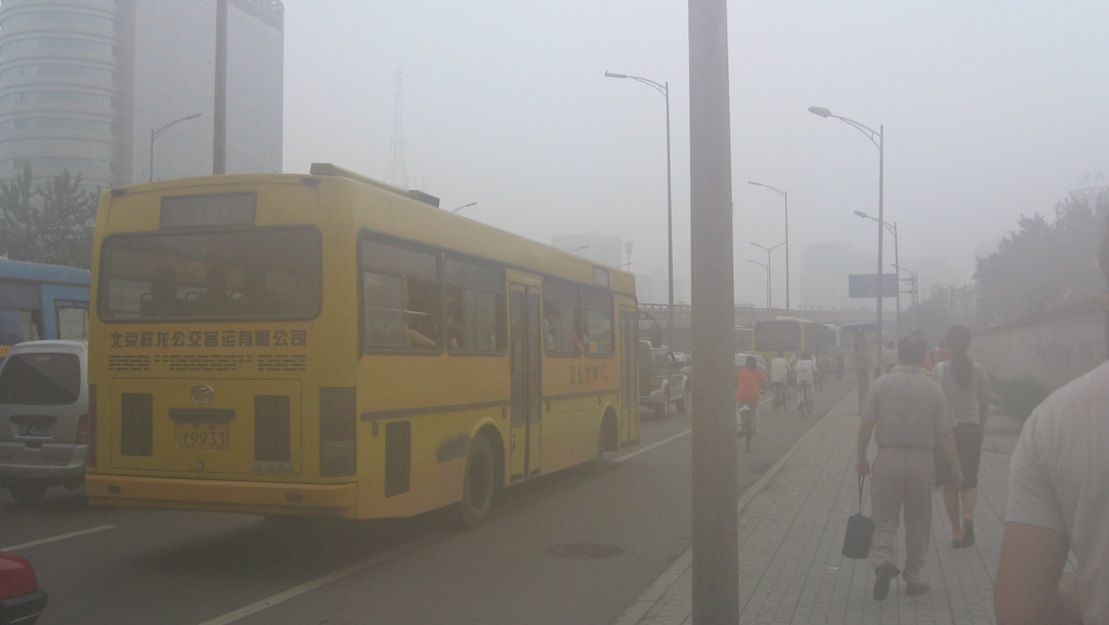.
A Woodstock for China
You sit within a public Chinese bus,
And out the window: buildings, concrete, dust,
Which all are perfect—life is simply thus.
You stare with shining eyes, soft-spoken trust.
A face so ruddy, beard and hair unkempt,
The locals turn to stare—once, twice, again.
Guitar appears, a voice without contempt,
And forgotten hymns to ‘69 begin.
The silence breaks, and Woodstock lives anew;
Anthems to universal love take wing—
An unasked psychedelic debut,
While workers stare through the haze of Beijing.
The brakes engage. The song breaks off, replaced
By silence—your communal dream misplaced.
.
.
Talbot Hook is a PhD student and occasional writer currently living in Connecticut.















A poem with many qualities, being subtle, evocative, poignant and telling.
Thanks for your kind words, Clive. Having witnessed this little episode first-hand (and having had it brew in my mind for over a decade), I too must have found something evocative about it! It does seem a bit sad to me, through whichever lens I look at it . . . .
Peace and love… A lovely, sad anachronism.
Appreciated, Tonia. I found the scene very powerful for its many juxtapositions.
Talbot, this is a confusion story, but perhaps that’s how you mean it. Do the brakes engage and stop the bus? Does the song break off because of that? The fake universal Woodstock love ended very badly for many persons who suffered violence there, and for more who tuned out with drugs for the rest of lives shortened or broken by the experience and the fantasy. A “communal dream misplaced” at the end of a miserable era!
Dear Margaret, I didn’t intend for the poem to be confusing — though perhaps a bit blurred and dreamlike. Ultimately, the engaging of the brakes broke off the song (though I cannot recall if this was traffic or at a bus-stop) and the “moment” was gone, as they say. If the poem is a bit unclear in its ending, it might just be a true reflection of the end of this hippie’s little Woodstock. It was as short-lived as it was powerfully odd. The “communal dream” didn’t turn out too well for many Chinese, either . . . .
As always, thanks for your attention! I always appreciate your comments.
Thanks for clarifying a little! You seem to be evoking the fairy-tale view of Woodstock, which does indeed have all the peace and love of the Chinese Communist regime. But you deserve credit for those last words. Whether it’s Woodstock music or Beijing air, it’s shared obscurity hiding what’s more important from the victims. I appreciate your listening!
There’s certainly a parallelism there that I was wanting to explore, so I hope that the last lines carried that out adequately. Have a lovely day, Margaret!
A thought-provoking poem that deserves more than a single read.
Thanks for the read, Talbot.
And thanks for reading, Paul! I appreciate it, and hope it’s better upon a second browsing.
Talbot, be assured I got your but point. So did my grown daughter.
You are one, creative and delightful poet, my man? contrast. Wow! The bleak deadness of Communist China against the freedom of Woodstock. Sure, there is an arrogance against Woodstock. Compared to today’ America? Looks so innocent! With rampant murder, Biden and his love lockdowns, pushing TG,etc. thank you, Talbit……~Patricia ~
These days communes would be verboten due to The”China Virus.” Censorship reigns today. The summer of love music was fabulous. When contrasted with today’s vulgar rap, in my opinion.